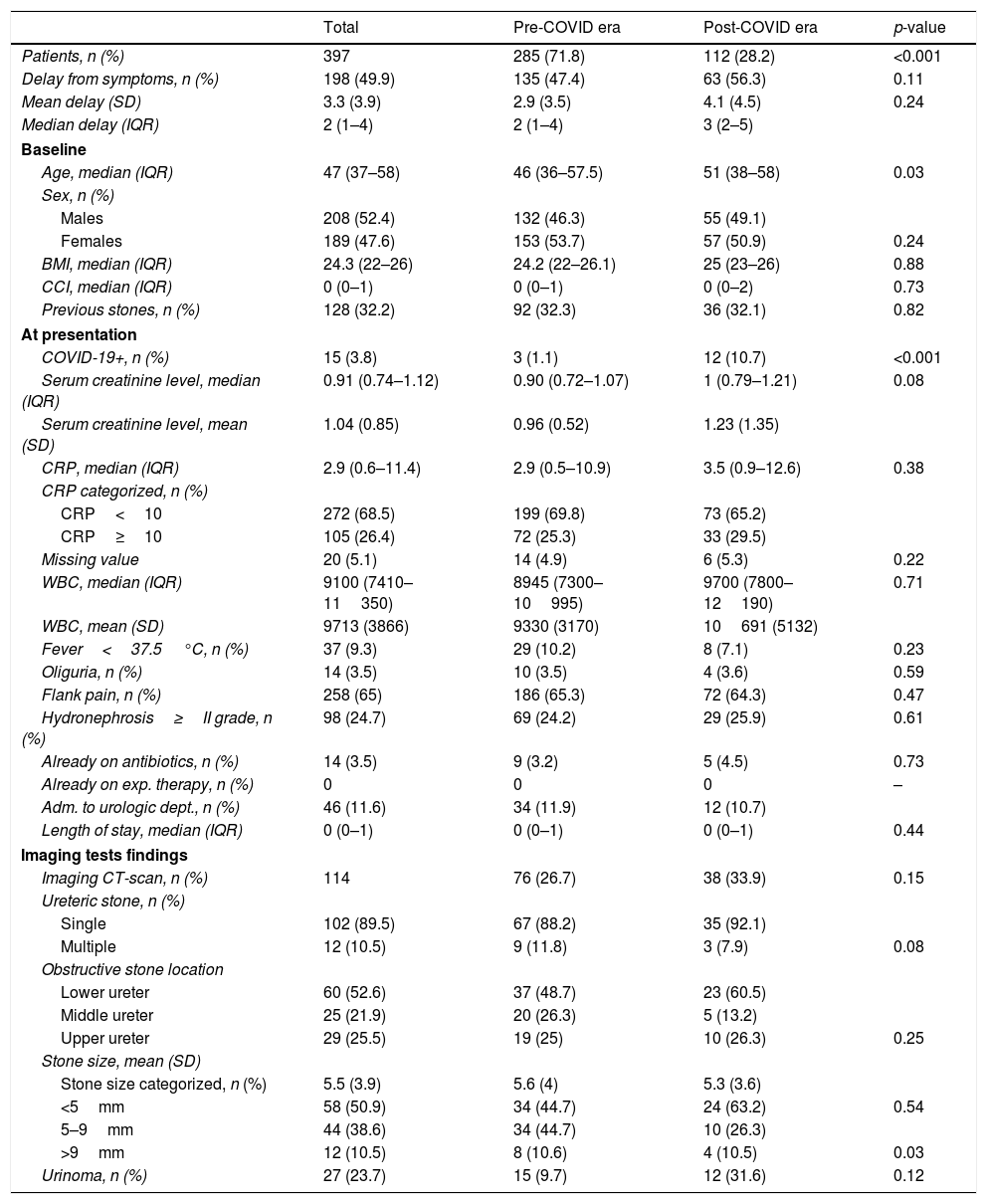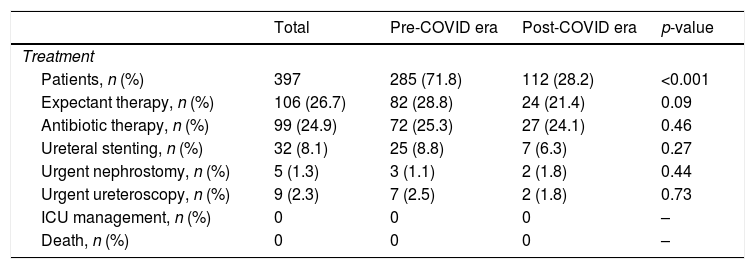We hypothesized that the recent COVID-19 pandemic may lead to a delay in renal colic patients presenting to the Emergency Department due to the fear of getting infected. This delay may lead to a more severe clinical condition at presentation with possible complications for the patients.
Material and methodsRetrospective review of data collected from three institutions from Spain and Italy. Patients who presented to Emergency Department with unilateral or bilateral renal colic caused by imaging confirmed urolithiasis during the 45 days before and after each national lockdown were included. Data collected included patients’ demographics, biochemical urine and blood tests, radiological tests, signs, symptoms and the therapeutic management. Analysis was performed between two groups, Group A: patients presenting prior to the national lockdown date; and Group B: patients presenting after the national lockdown date.
ResultsA total of 397 patients presented to Emergency Department with radiology confirmed urolithiasis and were included in the study. The number of patients presenting to Emergency Department with renal/ureteric colic was 285 (71.8%) patients in Group A and 112 (28.2%) patients in Group B (p<0.001). The number of patients reporting a delay in presentation was 135 (47.4%) in Group A and 63 (56.3%) in Group B (p=0.11). At presentation, there were no statistical differences between Group A and Group B regarding the serum creatinine level, C reactive protein, white blood cell count, fever, oliguria, flank pain and hydronephrosis. In addition, no significant differences were observed with the length of stay, Urology department admission requirement and type of therapy.
ConclusionData from our study showed a significant reduction in presentations to Emergency Department for renal colic after the lockdown in Spain and Italy. However, we did not find any significant difference with the length of stay, Urology department admission requirement and type of therapy.
Nuestra hipótesis es que la pandemia por COVID-19, y el estado de alarma impuesto por los gobiernos, pueden haber retrasado las visitas a urgencias por cólicos nefríticos, debido al miedo a contagiarse en los centros sanitarios. Este atraso en acudir a los servicios de urgencias puede llevar a un empeoramiento clínico y aumentar las complicaciones relacionadas con la enfermedad o el tratamiento recibido.
Material y métodosRealizamos una revisión retrospectiva de 3 centros hospitalarios en España e Italia. Fueron incluidos pacientes atendidos en el servicio de urgencias por cólico renal (unilateral o bilateral) secundario a litiasis confirmadas en pruebas de imagen durante los 45 días previos y posteriores a la declaración del estado de alarma de cada país. Se recolectaron datos demográficos, síntomas y signos de presentación, análisis de sangre y orina, pruebas de imagen, y manejo terapéutico. El análisis estadístico se realizó entre dos grupos, Grupo A: pacientes que acudieron antes de la declaración del estado de alarma y Grupo B: pacientes que acudieron tras la declaración del estado de alarma.
ResultadosUn total de 397 pacientes que acudieron a urgencias por cólicos nefríticos secundarios a litiasis fueron incluidos en el estudio, 285 (71,8%) en el Grupo A y 112 (28,2%) en el Grupo B (p<0,001). Un total de 135 (47,4%) en el Grupo A y 63 (56,3%) en el Grupo B (p=0,11) admitieron haber pospuesto su búsqueda de atención médica urgente. En el momento de la valoración inicial, no se encontraron diferencias entre ambos grupos en los niveles de creatinina sérica, leucocitosis, fiebre, oliguria, dolor, o hidronefrosis. Además, no se observaron diferencias en relación con la estancia media, ingreso en el servicio de urología, o necesidad de tratamientos invasivos.
ConclusiónNuestros resultados muestran una disminución significativa de atenciones en urgencias por cólicos nefríticos tras la declaración del estado de alarma en España e Italia. A diferencia de otros estudios publicados recientemente, no encontramos diferencias en la estancia media, ingreso al servicio de urología, o necesidad de tratamientos invasivos en pacientes que se presentaron antes y después del estado de alarma.








